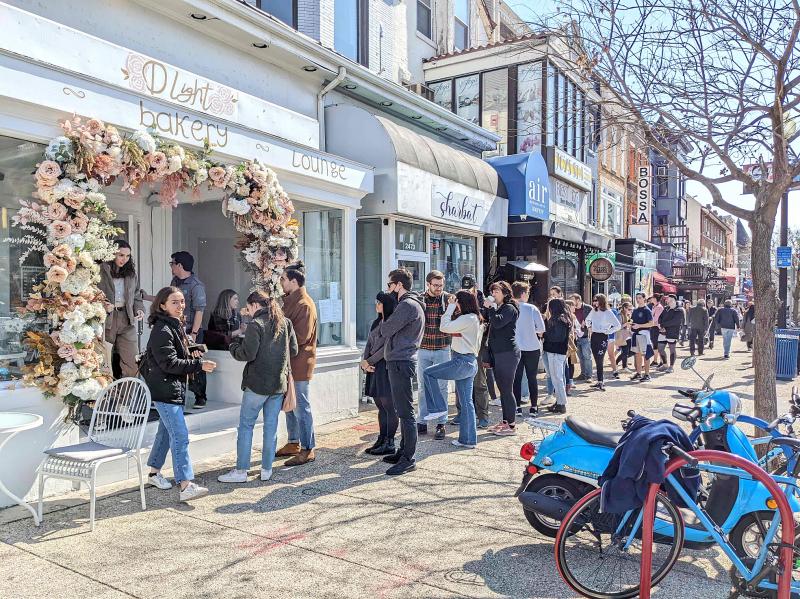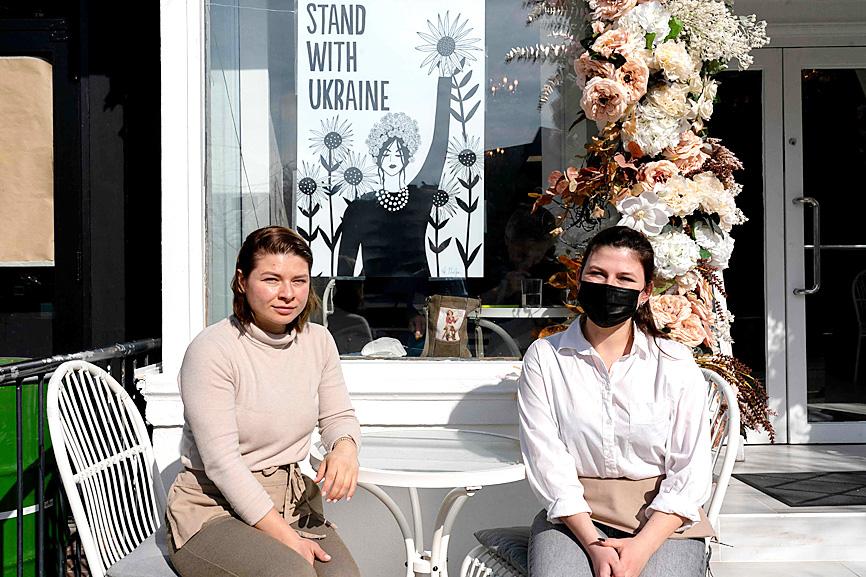Since the Russian invasion began, lines have stretched down the street outside a Ukrainian-owned cafe in a trendy part of Washington. Blocks away, at the city’s long-popular Russia House restaurant, five windows have been smashed in and owners are thinking they might not reopen.
With the war an ocean away, restaurants have become something of a culinary front line for Americans to channel support for Kyiv by queuing for a seat and a pastry, while hoping to inflict a bit of pain on Moscow, if only by proxy.
Sisters Anastasiia and Vira Derun, who own D Light Cafe and Bakery in the Adams Morgan neighborhood, are from Bila Tserkva, a city south of Kyiv that has found itself on the direct path of cruise missiles launched at the capital from the Black Sea.

Photo: AFP
The pair are wracked with fear for their family, and now, they are grappling with non-stop throngs of customers at their door.
“We don’t really sleep at night because we always keep checking [the news], but then we have to be here early morning,” Anastasiia Derun said.
During the weekend, dozens of people wait outside the cafe. On weekdays, the pastry case is quickly emptied by a constant stream of customers.

Photo: AFP
Overwhelmed, they stopped giving free Ukrainian flag cookies to people who came in to make donations in hopes it would keep the crowds down — and at one point contemplated halting fundraising for Ukraine altogether.
However, after raising US$7,500, the sisters could not put away the donation box, and they now have three volunteers helping manage the masses and run water to tables.
Abby Wright, a 23-year-old seated outside D Light Cafe over the weekend said she had come with her friends “understanding fully that there’s more tangible ways to support Ukraine than just buying coffee.”
Yet the experience, she said, allowed her to have “a little contact with that culture.”
A dozen blocks away, at Russia House, a Washington staple for more than two decades, the picture could not be more different.
The owners had been on the verge of reopening after a two-year COVID-19 hiatus when Russian President Vladimir Putin launched his invasion of Ukraine.
The restaurant has since been vandalized twice, in what police characterized as a hate crime, and its owners are contemplating whether to reopen at all given the public’s new distaste for all things Russia.
“We were an easy target,” said co-owner Aaron McGovern, estimating up to US$20,000 in damage.
The destruction included smashed windows, an uprooted stair railing and signs left behind with messages like “Don’t eat at the Putin House.”
McGovern said that as he swept up the glass, a passerby shot him the middle finger.
Since the invasion, Ike Gazaryan, owner of Pushkin Russian Restaurant in San Diego, has likewise received multiple threats, including a call from a screaming man “promising to blow something up.”
The irony, is that most Russian business owners in the US are extremely sympathetic to Ukraine, having themselves fled the former Soviet Union or Putin’s Russia, he said.
Ethnically Armenian, his family fled Azerbaijan, Uzbekistan and Russia before landing in the US.
His restaurant serves up food from a variety of former Soviet republics against a backdrop of damask wallpaper and chandeliers, but he said it has Russia in its name, because “everybody knows where Russia is — so you do this for marketing purposes.”
He estimated that the now-toxic Russian branding is driving clientele down 30 to 40 percent.
At the distinctly Ukrainian restaurant Veselka in Manhattan’s East Village, the opposite holds true.
Lines of up to 100 people have wrapped around the eatery and owner Jason Birchard, whose Ukrainian immigrant grandfather was the founder, said business is now “probably double to what I normally do.”
In Austin, Texas, restaurateur Varda Monamour, who was born in Crimea before moving to Moscow, simply yanked the word “Russian” off the exterior of her restaurant, formerly known as Russian House.
Where the letters once stood are now ghost markings. Her restaurant is to be called The House.
Its former name “just brings pain to people of Ukraine and others, even Russians,” Monamour said.

In Italy’s storied gold-making hubs, jewelers are reworking their designs to trim gold content as they race to blunt the effect of record prices and appeal to shoppers watching their budgets. Gold prices hit a record high on Thursday, surging near US$5,600 an ounce, more than double a year ago as geopolitical concerns and jitters over trade pushed investors toward the safe-haven asset. The rally is putting undue pressure on small artisans as they face mounting demands from customers, including international brands, to produce cheaper items, from signature pieces to wedding rings, according to interviews with four independent jewelers in Italy’s main

Macronix International Co (旺宏), the world’s biggest NOR flash memory supplier, yesterday said it would spend NT$22 billion (US$699.1 million) on capacity expansion this year to increase its production of mid-to-low-density memory chips as the world’s major memorychip suppliers are phasing out the market. The company said its planned capital expenditures are about 11 times higher than the NT$1.8 billion it spent on new facilities and equipment last year. A majority of this year’s outlay would be allocated to step up capacity of multi-level cell (MLC) NAND flash memory chips, which are used in embedded multimedia cards (eMMC), a managed

Japanese Prime Minister Sanae Takaichi has talked up the benefits of a weaker yen in a campaign speech, adopting a tone at odds with her finance ministry, which has refused to rule out any options to counter excessive foreign exchange volatility. Takaichi later softened her stance, saying she did not have a preference for the yen’s direction. “People say the weak yen is bad right now, but for export industries, it’s a major opportunity,” Takaichi said on Saturday at a rally for Liberal Democratic Party candidate Daishiro Yamagiwa in Kanagawa Prefecture ahead of a snap election on Sunday. “Whether it’s selling food or

In the wake of strong global demand for AI applications, Taiwan’s export-oriented economy accelerated with the composite index of economic indicators flashing the first “red” light in December for one year, indicating the economy is in booming mode, the National Development Council (NDC) said yesterday. Moreover, the index of leading indicators, which gauges the potential state of the economy over the next six months, also moved higher in December amid growing optimism over the outlook, the NDC said. In December, the index of economic indicators rose one point from a month earlier to 38, at the lower end of the “red” light.